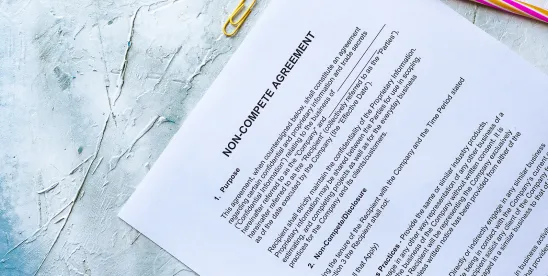On July 3, 2024, the U.S. District Court for the Northern District of Texas granted a preliminary injunction staying enforcement of the Federal Trade Commission’s (FTC) final rule prohibiting noncompetition employment agreements. The injunction is limited to the parties in that case, but it likely signals the FTC rule will ultimately fail to survive judicial scrutiny.
Quick Hits
- The U.S. District Court for the Northern District of Texas granted a limited preliminary injunction staying enforcement of the final rule published by the FTC as to the parties in that case, pending a final ruling on the merits. If implemented, the rule will bar virtually all non-compete agreements.
- The court found that the FTC’s effort to implement the rule likely exceeds its congressional authorization under the FTC Act and constitutes an arbitrary and capricious approach to the issue of regulating non-competes.
- Rather than issue a nationwide injunction barring enforcement of the rule across the country, the court’s ruling is limited to the parties in the case.
- The court intends to issue a final ruling on the merits by August 30, 2024, before the FTC rule is set to go into effect. The court’s subsequent ruling may prevent the ultimate implementation of the rule on a national level.
The FTC voted 3–2 vote to adopt the rule on April 23, 2024, and published it on May 7, 2024. The rule would have effectively banned all non-compete agreements—and provisions that functioned as non-competes—between employers and “workers” as “unfair method[s] of competition.” It also would have required employers to refrain from enforcing most existing non-compete agreements and notify “workers” that any non-compete obligations were now unenforceable. The rule is currently scheduled to take effect on September 4, 2024.
On April 23, 2024, Ryan LLC, a global tax consulting firm headquartered in Dallas, Texas, filed a lawsuit against the FTC in the U.S. District Court for the Northern District of Texas seeking to vacate and set aside the rule. The U.S. Chamber of Commerce filed a similar lawsuit a day later, which was ultimately consolidated into Ryan LLC’s lawsuit. That lawsuit, Ryan LLC v. Federal Trade Commission, is one of two lawsuits challenging the rule.
Ryan, ultimately joined by the Chamber, filed a motion to stay the effective date of the rule, seeking a preliminary injunction postponing the rule’s effective date pending a ruling on the merits. On July 3, 2024, the court granted the request for preliminary injunctive relief and stayed the effective date of the FTC’s rule, pending a final decision on the merits. However, the injunction is limited to the parties to the case, rather a nationwide injunction, as requested by Ryan and the Chamber.
The crux of the dispute between the FTC and the rule’s challengers is whether the Federal Trade Commission Act (FTC Act), passed in 1914, authorizes the FTC to regulate non-compete covenants, which have traditionally been regulated at the state level. The FTC argued that the rule is a permissible exercise of its congressional authority to regulate “unfair methods of competition” under the FTC Act. The Ryan court disagreed, concluding that the FTC’s adoption of the rule likely exceeds the FTC’s congressional authority. The court also concluded that the rule appears to be an arbitrary and capricious exercise of the FTC’s rulemaking authority on the issue of non-compete agreements. The court indicated that it would issue a final ruling on the merits on or before August 30, 2024, i.e., before the FTC rule is scheduled to take effect.
Key Takeaways
Although the decision in Ryan did not result in a nationwide injunction, it likely signals that the FTC’s non-compete rule will not survive judicial scrutiny. Absent an interlocutory appeal or a substantial change in the court’s reasoning, it appears the Ryan court is poised to strike down the rule prior to its scheduled effective date when it issues its ultimate decision on the merits in August. While the FTC rule is technically still alive as to parties other than the plaintiffs in Ryan, it is on life support at best, and employers should be able to take some comfort that the rule will not survive.
Regardless of the outcome of the Ryan litigation, the FTC’s rule is yet another reminder of the growing federal and state hostility to restrictive covenants (especially non-competes). Employers may want to take a close look at their current restrictive covenants and narrow them as much as practicable to what is actually needed to protect their legitimate business interests, including with respect to confidential information (trade secrets), goodwill in customers and employees, and unfair competition.








 />i
/>i

